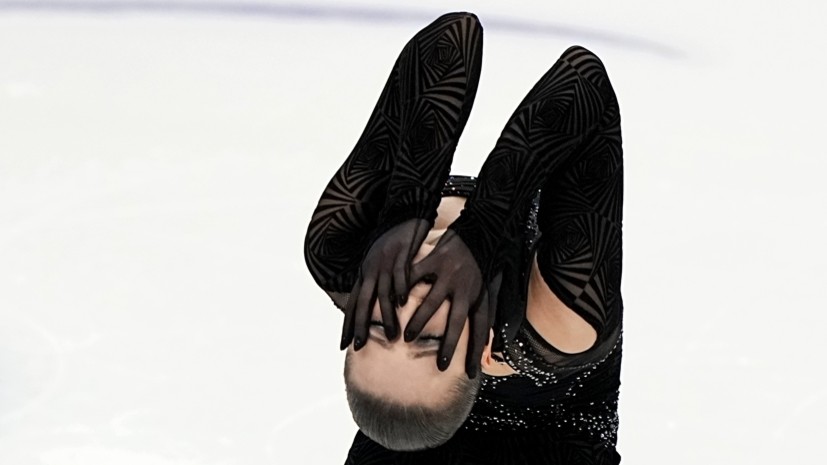The Russian Championship ended with a dramatic women's final, although it's hard to say that it turned out to be the most beautiful: in the free program, none of the top six figure skaters managed to avoid mistakes, and quite rude ones at that: Sofya Akatieva and Sofya Muravyova fell from the triple axel, Kamila Valieva and Elizaveta Tuktamysheva doubled a triple flip, Adelia Petrosyan failed with a quadruple loop, and Anastasia Zinina with the first of two quadruple sheepskin coats.
Only Veronika Yametova managed to skate cleanly (eighth result in the free skate), but her program was decently inferior in complexity to the declared content of older skaters.
In December 2021, the leitmotif of the women's tournament was a mantra repeated in different ways: no one can beat Valieva if she performs at least one quadruple jump in the program.
Only a year has passed, and the statement has dissipated.
Yes, in the free program, Kamila won almost seven points from Akatieva, but in the short program, breaking the triple axel, she lost nine ...
The final defeat of Kamila looked twofold: the basic technical complexity of Akatieva surpassed the main star of Russian single skating by eight points, while Valieva's final score for technique was higher.
If Camila hadn’t had a misfire in the short program, she would definitely have become a champion.
But sport, as you know, does not accept the subjunctive mood.
Speaking in sports, Valieva, even after losing, accomplished a feat: she returned two quadruple jumps to the program, one of which she performed in a cascade.
At the same time, it was painful to understand that the career of the most talented single skater in almost the entire history of women's skating is a kind of broken trough not only for the fan's hopes, but also for the aspirations of the figure skater herself.
The Olympic season turned out to be a nightmare for the skater, the current one is absolute devastation, the lack of clear prospects and the threat of disqualification, therefore, even looking at Valieva on the podium, it was impossible not to think that this was not her season and championship.
She was on her own at this ball, as if in a case, around which other heroes were already waltzing.
Akatieva, who received the gold, was more confused than happy.
Alina Zagitova looked about the same in the Olympic Pyeongchang, ahead of the queen - Evgenia Medvedev.
It seems to be happiness, but it is absolutely impossible to believe in it.
If the season were full, Akatieva's victory would mean nothing: due to her age, Sophia cannot compete in the international arena in the adult category.
Adelia Petrosyan (before the start of the championship she was considered the most likely favorite) was more fortunate in this regard: she was born a month earlier and could well have been selected for the national team if there was a place to compete.
Both athletes were noticeably superior in complexity to Valieva, but there is a paradox: the uniqueness and charisma of Kamila is striking even now, when the athlete is no longer in her former form, and the performances leave much to be desired.
You can't say the same about the new stars of Khrustalny.
Technologically, they are almost invulnerable, but their own face, which would be remembered and forced to admire, is not yet observed in either one or the other.
Of course, this is not the fault of the skaters.
Rather, it's the production cost of having coaches know exactly what element entries, spin positions, and accompanying steps in step sequences need to be in order to guarantee the maximum level of difficulty.
Plus, all this, as a rule, is put on a “childish” body.
This technique is especially noticeable on rotations.
As soon as Valieva grew up and matured, her once magical pirouettes lost the lion's share of charm.
Programs with such an approach become equally faceless, but here it is already, as in the well-known joke: “Do you want checkers or go?”
Are there any medals?
Well, fine.
Sofya Muravyova was left without an award (of those who claimed it after the short program).
But there is no one to blame: on an unsuccessful triple axel, the athlete lost about four points, plus another point - for the very fact of the fall.
It is generally accepted that fourth place is the most offensive thing that can happen to an athlete, but the main loser of the Saturday final was not Muravyova, but Sofia Samodelkina.
The figure skater, who won two stages of the Russian Grand Prix, was completely out of her feet that day.
She barely survived landing from a triple axel, fell while trying to perform a quadruple salchow (the jump came out under-rotated), another fall happened on a triple flip.
As a result - only the 11th result.
Tuktamysheva stood apart in the women's final.
All the epithets that could be said about her faded and lost their meaning against the background of a single plot: the skater glides in a long spiral and smiles, not even looking at the camera.
And to the soul of everyone who is sitting in front of the screen at this moment.
Lisa did not compete with either her rivals or herself.
She skated so selflessly, as if it were not taking place in an arena surrounded by stands, but somewhere on a vast and deserted frozen lake.
I rode for myself, not for others.
And maybe a little for the coach.
Alexey Mishin with a bouquet of red roses looked least of all like a strict mentor.
I even thought: with such an expression on their faces and admiration in their eyes, only his most devoted fans are waiting for their idol.
However, at the time of Tuktamysheva's skiing, Mishin was just that.

